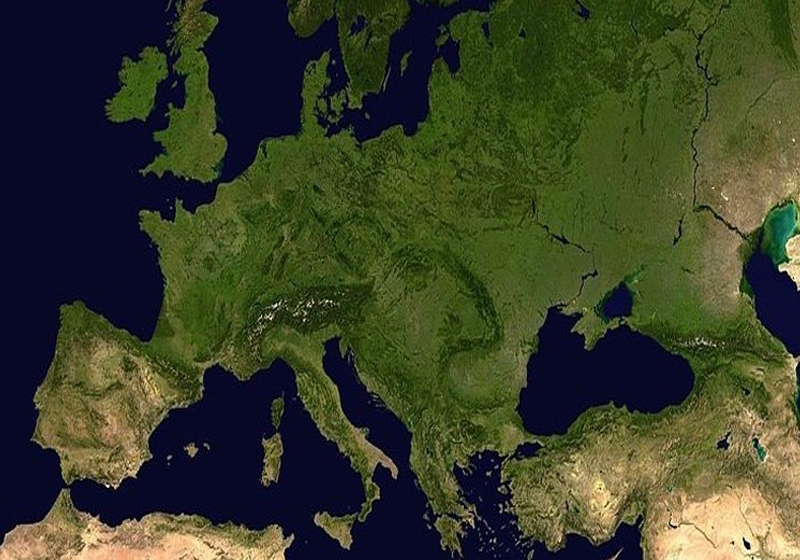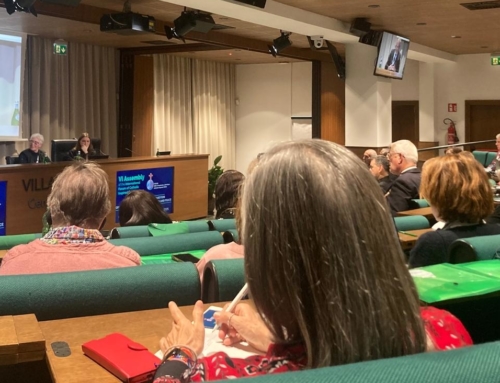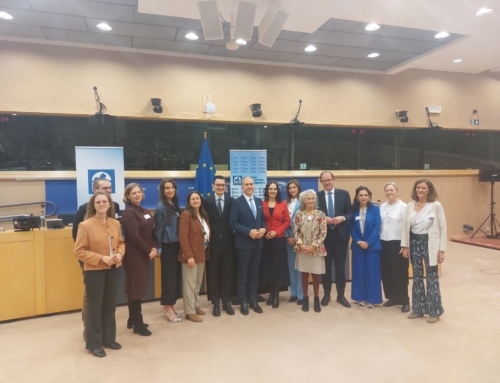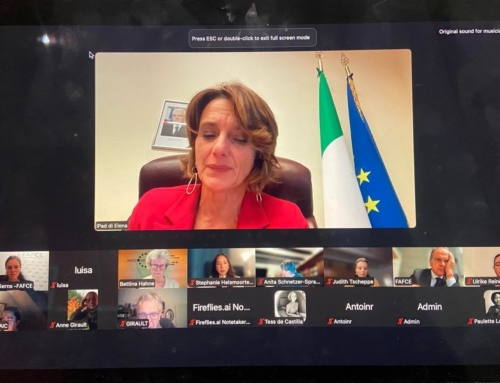Antoine Renard, FAFCE President
Founded to serve families in the light of the social teaching of the Catholic Church, and having done so for years as part of FAFCE in the context of European integration, our associations must always strive to find their rightful place in the threefold need to support, promote and protect the family.
They are encouraged in this task by the highest authorities of the Church, especially since Saint John Paul II, the “pope of the family ” according to Benedict XVI, whose constant teaching not only shows us how to regulate our actions, but even more so the spirit in which they should be carried out.
Support
“We are well aware of the many challenges facing families today, and we know how difficult it is, in current social conditions, to achieve the ideal of fidelity and solidarity in conjugal love, to bring up children, and to preserve the harmony of the family unit.” Benedict XVI – May 2008 – Forum of Family Associations
Families are in urgent need of support in all areas, economic and social but also legal and spiritual.
The Charter of the Rights of the Family, proposed by the Holy See in October 1983, is, according to Benedict XVI, “addressed to all families, inspiring them to join forces in the defense and promotion of their rights.” The Pope added “in this regard your associations are particularly well-adapted to implement its’ spirit in the best way.”
“You can sponsor cultural activities in schools, parishes, dioceses, in the media, and organize events that will resonate in public opinion…” Cardinal Antonelli told us in Brussels in December 2009.
Supporting families also means and perhaps especially encouraging Christian families to grow in their spiritual life and their witness of the Gospel; “we need more, not less family to cure society’s ills” continued the Cardinal, “but it takes a lot of families that have a surplus of unity, openness and beauty. ”
“The challenges and hopes that the Christian family lives require that an increasing number of families discover and put into practice a strong family spirituality in the daily routine of their existence.” Saint John Paul II – speech on 12 October 1980.
Supporting families involves promoting an “ecology of man”, as was suggested by John Paul II and also stated by Benedict XVI: ” The book of nature is one and indivisible: it takes in not only the environment but also life, sexuality, marriage, the family, social relations: in a word, integral human development.” Caritas in Veritate. This gives full meaning to education of and by the family.
Promote
“Any society that is interested in its future cannot fail to address the family and put it on its program.” confirmed Benedict XVI.
“By devoting yourselves to the promotion of the family, you are endeavoring to give a soul to the European Union, to give a future to our civilization,” Cardinal Antonelli commented to us, “you are not the expression of just any economic, political or media group, but you give a voice to the experiences and the wishes of a multitude of concrete subjects, such as families, which are the vital cells of the peoples of Europe.”
Promoting the family so that society supports its needs entails showing the benefits it brings as family, not just as “a group of individuals with needs to be met, but as a necessary wealth, a subject of community gifted with t important social functions,” or, as we say, Europe’s treasure.
In his Letter to Families of February 1994, John Paul II made it clear that family life extends to the whole of society, that it embraces all dimensions of human existence, that it enables” an atmosphere of relationship, the atmosphere of love”, a community of particularly intense interpersonal relationships, that break loneliness, the great evil of our century.
Promoting the family reveals the close link between “the values written in the heart of humanity: life, family and education.” Benedict XVI
Promoting the family is showing the benefits of an education in a natural, healthy family, even if it will of course always be imperfect, as opposed to the obvious and serious deficiencies of broken homes or destroyed families. The family is “indissoluble” said Pope Francis, pointing out that for the child, the family survives divorce and that nothing can replace it.
To promote the family we need to encourage parliamentarians and politicians to look at situations clearly, to dare to say what they all know, whatever their personal situation may be, namely that the stable family is the most economical, most happy, most useful form of social organization, without fear of seeming to disavow those who do not live it.
Promoting the family so that it be legitimately supported means highlighting its most concrete aspects, and publicly showing that it remains the accessible dream of many.
Protect
The family, now as always, needs to be protected.
The Cardinal Antonelli, encouraging us to be brave and have confidence, already said as much 7 years ago! “Your opponents are powerful intellectual, economic and political elites that seek to impose gender ideology and implement an anthropological revolution through the codification of new rights, which are nothing but subjective and individual desires, contrary to the cohesion and the integral development of society.”
The family needs to be protected by all possible means. “You must, with all your prayers, with your testimony, with your strength, you must help the family, you must protect it against every kind of destruction. If there is no other dimension in which man can express himself as a person, as life, as love; it has also to be said there is no other place or environment in which man can be so destroyed. Today many things are being done to normalize this destruction…in this sense people speak about “protecting”. But the family cannot really be protected without going to the root, without entering into its deep reality, into its intimate nature; and this is the communion of persons in the image and likeness of the divine community.” Saint John Paul,30 December 1988
The family needs to be protected by the law, and this is the meaning of the Charter of Family Rights, which remains an urgent priority, applauded at the time but still ignored by law makers.
The family needs to be supported by institutions and specific instruments in order to benefit from effective family policies, driven by the European Union.
Through the two speeches made in Strasbourg last November at the European Parliament and the Council of Europe, Pope Francis wanted to offer “a message of hope and encouragement to all the citizens of Europe.”
Recalling that confidence in man, as a person endowed with a transcendent dignity, was at the heart of the ambitious political project of the European Union, the Pope invited the legislators to continue to promote human rights, so as to advance the dignity of the person, but by linking the personal aspect to that of the common good, of the “all of us” made up of individuals, families and intermediate groups, considering man as a relational being, and in recognizing the preciousness of human life, taking care of its fragility.
Referring to the globalized economy, democracy, secularism, unity in diversity, he mentioned the role of Christianity in the development of a humanism centered on respect for the dignity of the human person and reiterated the readiness of the Church to engage in meaningful, open and transparent dialogue.
To give Europe hope, continued the Pope, also implies “investing in individuals and in those settings in which their talents are shaped and flourish.” The first area is “education, beginning with the family, the fundamental cell… the family, united, fruitful and indissoluble, possesses the elements fundamental for fostering hope in the future” and in educational institutions which must promote human ecology;
Secondly, labour, which ensures the ability to creating a family and educate children.
Finally, referring to the migration issue, François affirmed the need for Europe to clearly assert its own cultural identity, and reminded the legislator of his responsibility to protect it and enable it to develop.
The Pope reminded the members of the Council of Europe, in their mission to promote peace, freedom and human dignity, of the founders’ intuition who understood that peace is a good which must continually be attained, which requires being constantly open to initiating processes and carrying them forward, calmly, yet with clear convictions and tenacity “in a constant path toward humanization.”
To a “tired and pessimistic” Europe, Francis recalled the role of culture, the need to preserve its roots, and the importance of repeated creativity to cope with new challenges;
The Pope said that an ethical reflection on human rights, protection of life, welcome of migrants, labour and restoring dignity to labour, protection of the environment are all areas where the Church, an “expert in humanity”, seeks nothing other than to serve and to bear witness to the truth…to support the progress of humanity and help Europe “rediscover the youthful spirit that made it fruitful and great.”
These two complementary texts highlight in a special way the work we must try to achieve, but above all the spirit in which we must go about it.







